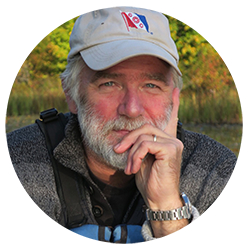
There is no more passionate voice for rivers and the storied canoes of New Brunswick than author and journalism professor, Philip Lee. I was delighted to read his new book called Restigouche: The long run of the wild river (available in the Canadian Canoe Museum’s store) this fall and then to have a chance to connect with Philip to talk about the book and what it has to say about the relationship between people and nature, past, present and future.
Canoes […] are a passageway to worlds that we would not be able to encounter without them. The places we go in our canoes are places that we could not go otherwise; the things we are able to see in our canoes are things we could not see without them.
Philip Lee
I think what I enjoyed most about our conversation is how different and distinctive are the New Brunswick imperatives for canoes and canoeing. For example, Philip talked about how giving up his paddle or his small outboard motor for a pole for getting up and down the fish-twitching shallows of the rivers of his home province completely changed his world. Similarly, to hear him talking with such passion about Sharp canoes and Miller canoes and how these, though lesser known than the Chestnuts for which New Brunswick is world-renowned are craft designed and made precisely for the places where they are used. The Museum is fortunate to count Philip among the members of the National Council, as a voice for New Brunswick but also as a passionate defender of rivers and a wonderful storyteller.
You can check out our conversation below and if you’d like to know more about Philips’s other books or to read his engaging blog you can connect with him at www.philiplee.ca.

James has been a part of the museum since its inception, having held a number of roles including, most recently, the Director of Development and Director Emeritus. He served as the Executive Director from 2008 to 2014, the Curator in 2007, and worked on the first education program in 1999. This work stemmed from his volunteer involvement on the museum’s Education Advisory Committee in the 1990s, which he undertook as a professor at Queen’s University in the Faculty of Education. He held a number of positions with Queen’s from 1982 to 1999 and is also a graduate of the University. James holds a Doctor of Philosophy, Master of Education, Bachelor of Education and Bachelor of Science. He is a celebrated author of numerous books including, Ice Walker: A Polar Bear’s Journey Through the Fragile Arctic, Circling the Midnight Sun: Culture and Change in the invisible Arctic, and the national bestsellers Emperor of the North: Sir George Simpson and the Remarkable Story of the Hudson’s Bay Company and Deep Waters: Courage, Character and the Canoeing Tragedy of Lake Timiskaming. James has been honoured with numerous recognitions and awards, including the Meritorious Service Medal from the Governor General of Canada, Honourary Doctor of Laws from the University of Guelph, and a number of others related to his considerable work as a writer and outdoorsman. Years spent as a camper and staff member at Camp Kandalore from 1959 to 1973 inspired James’ lifelong interest in the collection.






